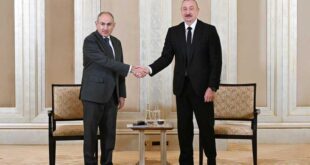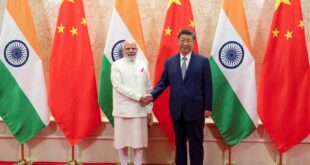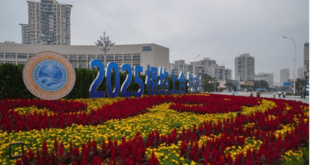One year and a half after the start of the Saudi-led ‘Decisive Storm’ aerial bombing campaign, the tables are turning in Yemen. The intended targets of the assault – the Houthi Ansarallah movement and the followers of former president Ali Abdallah Saleh – have moved on from their initial survival and acclimatization stage. They have gone into decidedly offensive and escalatory mode, attacking ‘hostile’ naval vessels in the Bab al-Mandeb Strait with land-to-sea missiles, and firing long-range rockets deep into Saudi territory at a military base in Taef more than 500-km away.
These actions say two things about the Houthi-Saleh alliance: First, its confidence in itself and its capabilities has grown, as has the Saudi-led coalition’s frustration at the war’s intractability and its failure to achieve any of its aims. Second, it has evidently acquired some sophisticated equipment to upgrade its military capacity, probably provided by Iran.
This self-confidence 0was reflected in the targeting, twice over the course of four days, of a US navy destroyer by missiles fired from territory held by the Houthi-Saleh alliance, and the docking in ports under its control of arms shipments in open defiance of the Saudi-led coalition’s maritime, aerial and land blockade of the country.
The missiles fired at the USS Mason missed. They were probably not intended to cause physical damage, but to deliver a powerful message to the US: that its naval presence in the waters off Yemen is unacceptable so long as it remains a party to the war. It will be treated as a combatant if it continues arming and providing logistical support to the Saudi coalition and supplying it with targeting intelligence gleaned by its spy satellites and drones – which it uses for targeting suspected al-Qaida members in the south of the country, producing significant collateral damage in the process.
Viewed in the wider regional context, the Houthi-Saleh alliance is gradually becoming part of the coalition grouping Russia, Syria, Iran and Iraq in opposition to the American-Western-Saudi-Gulf camp. The pot-shots against the American destroyer, and the earlier missile attack which severely damaged a supply ship leased by the UAE military off the Yemeni coast, did not come out of the blue. Both were likely carried out in consultation with more powerful allies. Why else would two Iranian warships have been dispatched to Bab al-Mandeb after the missile exchange?
The Houthis officially denied any involvement in the targeting of the US warship, but the Americans were unconvinced. They responded with missile attacks on three radar platforms that may have been used to launch the attacks. This remained a measured reply. The Americans went through the motions of retaliating, but in a way that avoided causing casualties and provoking further escalation.
But the war-fronts are heating up in Yemen – especially on the Saudi-Yemeni border where attacks on Saudi positions have been stepped up — and containment of the situation may no longer be an option.
A new element in the equation was introduced by Saturday’s multiple bombing by Saudi warplanes of the Grand Hall in Sanaa where condolences were being received for Jalal al-Rishwan, father of the current Houthi-appointed interior minister. It is hard to overstate the outrage caused by this incident. This was a war crime par excellence, even compared to the earlier Saudi bombing of hospitals and other civilian facilities. The deceased was a widely respected non-partisan figure, and the Saudis would have known that hundreds if not thousands of ordinary people and dignitaries would be present at his wake. They were evidently led to believe by their spies on the ground that senior Houthi figures would be among the mourners, as well as former president Saleh and senior aides. So they opted to bomb the facility regardless, in the process killing around 140 people and injuring more than 500.
The Saudis initially tried to deny involvement in the attack. Faced with overwhelming evidence to the contrary, they eventually conceded responsibility and promised an inquiry. This was mainly in response to the outrage caused by the incident in the West. Even Saudi Arabia’s US and UK allies, who have so far given it a free hand in Yemen while desperately resisting attempts to restrict their lucrative arms sales to the kingdom, felt compelled to object. More significantly, the funeral massacre has mobilized Yemeni opinion against the Saudi intervention and in favour of calls for revenge, even among sections of the public who never previously supported the Houthi-Saleh alliance
The Saudis tried to make amends by offering medical treatment abroad to anyone injured in the attack. But this only added insult to injury. Saudi Arabia’s airstrikes have rendered most of Yemen’s hospitals inoperative, and it has kept Sanaa airport closed for the past six months, preventing the evacuation of any wounded persons abroad. Its blockade has reduced the lives of millions of Yemenis to misery, so its belated attempt to demonstrate humanitarian concern fell on deaf ears.
Saudis Arabia has over-reached itself in Yemen. It thought it could score a quick and spectacular victory that would facilitate the rise of its deputy crown prince and defence minister Muhammad Bin Salman. But it overestimated the power of its expensively-equipped but incompetently-led and inexperienced forces, and underestimated that of its poorly-funded but resilient and battle-hardened Yemeni foes. It mistakenly assumed it could recruit indebted allies like Egypt and Pakistan to do most of its fighting on its behalf. And in its arrogance, it turned its back on international mediation efforts to seek a political settlement.
As a consequence, the war in Yemen is now poised on the verge of internationalisation. If the US allows itself to get increasingly dragged in, we should not be surprised if Russia follows, as in Syria. The dynamics of the conflict are changing, and God only knows what the coming weeks and months will bring.
By Abdel Bari Atwan
 Geostrategic Media Political Commentary, Analysis, Security, Defense
Geostrategic Media Political Commentary, Analysis, Security, Defense





